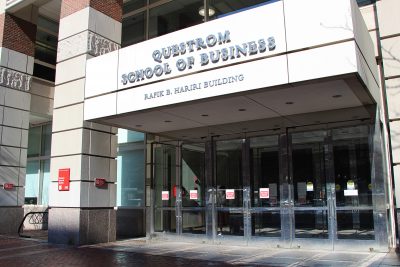After awareness around the Black Lives Matter campaign skyrocketed over the summer, diversity and inclusion within academic and workplace environments — or lack thereof — became a point of national dialogue.

Diversity and inclusion becomes even more relevant when crafting a job application and leveraging a unique identity to secure that dream job.
UBS, a multinational investment bank and financial service company, held a webinar with Boston University’s Questrom School of Business Monday titled “Embracing the power of being uniquely you,” to advise students on how to apply for their ideal career while embracing their identities.
The webinar featured members from MOSAIC and PRIDE, UBS employee networks promoting diversity and inclusion for ethnically diverse and LGBTQ+ communities, who shared their own experiences of landing their careers.
Mariana Atencio, an award-winning news personality, motivational speaker and author, co-hosted the event.
In her keynote presentation, she spoke about the importance of not discounting one’s own identity when applying for jobs — though she understands the temptation of trying to fit in.
“I was an immigrant from Venezuela, I had a slight accent … so my first inkling was to hide some of those things, to look like everybody else,” she said. “That’s the first mistake I want you to avoid.”
However, she said only stating one’s identity as an advantage during the job application process is not enough: She said people should provide an answer that challenges the “status quo” and relates to the unique skill set a person can bring to the company.
“Show them you have integrity by showcasing how passionate you are about these things you do,” she said at the event. “But also, don’t only think of you. One of the foundations of storytelling, that’s my expertise, is knowing your audience.”
She also said when interviewing for jobs, applicants should view it as “the beginning of a very important relationship,” comparing it to a marriage.
Joseph Hershberger, vice chairman of financial institutions at UBS Group AG, said an important strategy for individuals navigating a career path is creating networks and connections with others through storytelling.
“Folks on Wall Street, people at UBS, are always looking for people who can hit the ground running,” he said at the event. “I think really leveraging your network, going out and meeting, or going through the various recruiting processes … is the best advice I can give.”
Jessica Senquiz, a junior in Questrom and the College of Communication who works at the Center for Diversity, Equity and Inclusion at Questrom, said the center provides opportunities for students to create networks with others in similar fields. She said taking a Questrom seminar has also helped her craft her network.
“As a student of color and first generation college student, I found that was really, really impactful to have those professional connections that I wouldn’t have had otherwise,” Senquiz said, “which really can mess with your confidence.”
Senquiz said the seminar gives students the chance to participate in company visits, allowing them to gain a better understanding of professional organizations.
The UBS webinar also touched on imposter syndrome, which Senquiz said is a big concern among college students and something she is trying to combat through her work.
“For a lot of students, it manifests in the way of feeling like you don’t belong here,” she said. “What we work on is trying to make sure that students believe that they are supposed to be here and they’re very qualified and they should be confident.”
Senquiz said the Center for Diversity, Equity and Inclusion works to help students overcome that imposter syndrome, which often affects minority students.
“Oftentimes it can also happen, not just because of qualifications, but because of representation,” Senquiz said. “If you’re going to a company and you don’t see anybody who looks like you, you’re going to feel like this isn’t the spot for me.”
The Center for Diversity, Equity and Inclusion offers academic mentoring and workshop events to help students combat those feelings of professional inadequacy by fostering confidence, Senquiz said.
Senquiz said it’s important for students of color and those in the LGBTQ+ community to feel welcome in academic and business environments, both for themselves and for the institutions they belong to.
“If we’re not able to bring our authentic selves into spaces, our perspectives are going to be lost from the conversation … and our perspectives are valuable,” Senquiz said. “Homogenous thought is never useful for innovation, complex decision making or simply empathy and understanding.”
















































































































